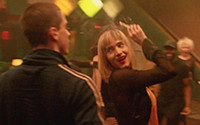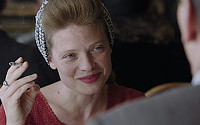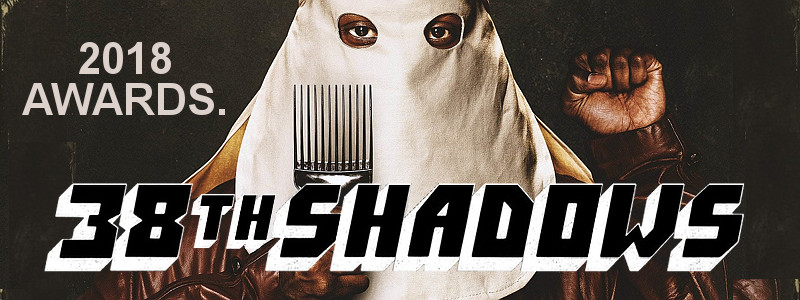| SHADOWS ON THE WALL | REVIEWS | NEWS | FESTIVAL | AWARDS | Q&A | ABOUT | TALKBACK | ||
 Shadows off the beaten path Shadows off the beaten path | ||
| Indies, foreigns, docs, revivals and shorts... | ||
|
On this page:
CLIMAX |
COLD WAR MEMOIR OF WAR | REVENGE [HEVN] < < F O R E I G N > > last update 16.Aug.18 See also: SHADOWS FILM FESTIVAL | ||
| R E V I E W B Y R I C H C L I N E | ||
Climax

| ||
|
dir-scr Gaspar Noe prd Brahim Chioua, Richard Grandpierre, Vincent Maraval, Edouard Weil with Sofia Boutella, Romain Guillermic, Souheila Yacoub, Kiddy Smile, Claude Gajan-Maull, Giselle Palmer, Taylor Kastle, Lakdhar Dridi, Thea Carla Schott, Sharleen Temple, Adrien Sissoko, Kendall Mugler  release Fr 19.Sep.18,
release Fr 19.Sep.18, UK 21.Sep.18 18/France 1h35 TORONTO FILM FEST 
|  Gaspar Noe doesn't make films for entertainment; he makes them to provoke visceral reactions. And this may be his most visceral project yet, taking a group of happy, fit young people and stripping them back to their elemental inhumanity. It's both full of life and hard to watch, sometimes tipping over the top in indulgent ways. But it's utterly unforgettable.
Gaspar Noe doesn't make films for entertainment; he makes them to provoke visceral reactions. And this may be his most visceral project yet, taking a group of happy, fit young people and stripping them back to their elemental inhumanity. It's both full of life and hard to watch, sometimes tipping over the top in indulgent ways. But it's utterly unforgettable.
In 1996, after rehearsing for three months in an empty French school, a group of dancers finally mastered their elaborate performance. So they throw a party, bantering and dancing. Then as they're all high on life, they begin to hallucinate and feel paranoid. Someone spiked the sangria with acid. Maybe it was single mum Emmanuelle (Gajan-Maull), who made it? Or blame Arabic non-drinker Omar (Sissoko)! Meanwhile, Selva (Boutella) is growing increasingly frantic, David (Guillermic) is trying to seduce Gazelle (Palmer), and her brother (Kastle) is weirdly jealous as everyone dissolves into their most primal behaviour. As usual with Noe, bravura camerawork is deployed in super-long takes that swirl to the ceiling and floor, following characters around the maze-like school. The first section is the most dazzling, as some 20 dancers perform an elaborate, fierce vogueing battle. The dancing is breathtaking, the conversational snippets witty and telling. Everything is drenched with primary colours. And the movie itself is deconstructed, with end credits first, and musicians, actors and filmmakers in the middle. Each of the dancers creates a vivid character, and some come to life more forcefully than others. Along with the astonishing Boutella at the centre, standouts include Guillermic as a swaggering lover-boy who becomes the brunt of everyone's anger. His early scene with the wry Sissoko is terrific, as are the two chuckleheads bragging about their sexual exploits. Yacoub's Lou gets some of the film's strongest moments, while Dridi's giggly Riley has one of the most compelling plotlines, which is oddly abandoned. Together, these people create a wave of earthy emotion as they find their inhibitions and instincts jumbled on this outrageous night. Noe sometimes tries a little too hard to echo the levels of hell, which isn't difficult when the cast is full of acrobatic contortionists. So the dizzying final sequence is almost mind-boggling in its visual intensity, creating devastating emotions even if we're not completely sure what has happened. But we fully understand that Noe is exploring the beast that lies within each of us. And making every other movie out there look limp. | |
|
15 themes, language, violence, sexuality 24.Aug.18
| | |
| R E V I E W B Y R I C H C L I N E | ||
Cold War
 MUST
MUST  SEE SEE
| ||
|
dir Pawel Pawlikowski scr Pawel Pawlikowski, Janusz Glowacki prd Ewa Puszczynska, Tanya Seghatchian with Joanna Kulig, Tomasz Kot, Borys Szyc, Agata Kulesza, Cedric Kahn, Jeanne Balibar, Adam Woronowicz, Adam Ferency, Drazen Sivak, Slavko Sobin, Anna Zagorska, Tomasz Markiewicz  release Pol 8.Jun.18, UK 31.Aug.18 18/Poland Film4 1h24
|  A companion piece to the Oscar-winning drama Ida, this striking Polish drama tells a twisty love story that spans the 1950s and 1960s. Writer-director Pawel Pawlikowski not only creates vivid characters who both entice and infuriate us, but he tells their story in the context of larger geopolitical shifts to create a film that already feels like a classic. Not only is it complex and moving, but it's also devastatingly beautiful.
A companion piece to the Oscar-winning drama Ida, this striking Polish drama tells a twisty love story that spans the 1950s and 1960s. Writer-director Pawel Pawlikowski not only creates vivid characters who both entice and infuriate us, but he tells their story in the context of larger geopolitical shifts to create a film that already feels like a classic. Not only is it complex and moving, but it's also devastatingly beautiful.
In post-war rural Poland, musician Wiktor (Kot) and his colleague Irena (Kulesza) are scouting for folk music artists, building a musical troupe. The star performer is Zula (Kulig), a sparky young woman who begins a fling with Wiktor. After preparing for two years, they finally open their show in Warsaw to great acclaim, especially from their state apparatchik Kaczmarek (Szyk). But now the officials want them to also sing the praises of Stalin. So as they tour mid-50s Berlin, Wiktor hatches a plan to defect with Zula to the West. Then she abandons him. From here, the story crisscrosses Europe to Paris, Yugoslavia and back to rural Poland as Wiktor and Zula find themselves unable to forget about each other even as their lives and, most intriguingly, outlooks take very different paths. As with Ida, the film is shot in square-ratio black and white, and cinematographer Lukasz Zal gives every frame an artistic eye, combining a vivid sense of light and shadow, a fine awareness of detail and clever framing. And all of this in service to story and themes. Kot and Kulig develop a powerful connection that's palpable even when they're not on-screen together. Both invest intelligence and emotion into their characters, making Wiktor and Zula into distinct people who don't really go together but also don't work when they're apart. Their relationship is so textured that it feels almost overpoweringly real, and the way it also becomes a fascinating echo of the push and pull between East and West is darkly resonant. There are moments here in which Pawlikowski echoes masters like Fellini and Hitchcock with waves of wicked comedy, dark suspense and impending tragedy. But he also has a singular voice all his own, unfurling this story with a lyrical grace that mixes passion, pain and humour with profound political awareness. It's the kind of movie that constantly surprises the audience with visual imagery and emotional rawness, and it presents such complex characters that it's impossible not to fall right into the story ourselves. | |
|
15 themes, language, sexuality, violence 13.Jun.18 | ||
| R E V I E W B Y R I C H C L I N E | ||
Memoir of War
 La Douleur La Douleur
| ||
|
dir-scr Emmanuel Finkiel prd Yael Fogiel, Laetitia Gonzalez, Etienne Mallet, David Gauquie, Julien Deris, Michel Merkt, Vincent Roget with Melanie Thierry, Benoit Magimel, Benjamin Biolay, Gregoire Leprince-Ringuet, Emmanuel Bourdieu, Anne-Lise Heimburger, Patrick Lizana, Shulamit Adar, Joanna Grudzinska, Elsa Amiel, Caroline Ducey, Salome Richard  release Fr 24.Jan.18,
release Fr 24.Jan.18, US 17.Aug.18 17/France Cinefrance 2h07 |
 Whispery and introspective, this WWII drama is based on the memoir by author-filmmaker Marguerite Duras. It's a slow-burn epic that builds quiet intensity from the start, anchored by a riveting, deeply felt performance by Melanie Thierry. Without being flashy, writer-director Emmanuel Finkiel and cinematographer Alexis Kavyrchine bring the period to life with skill and artistry.
Whispery and introspective, this WWII drama is based on the memoir by author-filmmaker Marguerite Duras. It's a slow-burn epic that builds quiet intensity from the start, anchored by a riveting, deeply felt performance by Melanie Thierry. Without being flashy, writer-director Emmanuel Finkiel and cinematographer Alexis Kavyrchine bring the period to life with skill and artistry.
Acclaimed novelist Marguerite (Laurent) finds a diary she doesn't remember writing, documenting more than year seeking news about her husband Robert Antelme (Bordieu), who had been arrested by the Nazis. A year earlier in June 1944, she makes contact with detective Pierre (Magimel), who offers her an update. But her literary friends in the resistance don't like her mixing with collaborators; Dionys (Biolay) warns that he will use her to get to them. But Pierre is star-struck by Marguerite, suggesting a series of clandestine meetings. Meanwhile, political prisoners like Robert are being deported to Germany. The story floats almost feather-like, using depth of focus to remain tantalisingly out of reach events unfold through Marguerite's frazzled perspective. This cleverly explores the idea of how memory can often be misleading, and why accounts of events vary from person to person. It also lends the film a remarkable underlying sense of intrigue, as Marguerite waits and waits for a definitive word about Robert, even though she's not sure she can trust Pierre. Thierry has terrific presence as a woman whose concern for her husband makes her vulnerable even as her intelligence protects her. This plays out in scenes with Magimel, as Marguerite acts the ignorant wife begging for information and Pierre hopes that he can exploit her. Their scenes bring everything to life so vividly that the film almost deflates after he leaves the story. But Marguerite perseveres, and Biolay's beautifully underplayed Dionys becomes her hope. Duras' original title refers to the pain of not knowing, of misplaced loyalties and elusive justice. It's the feeling of anyone who has had to wait for what seems like an eternity for word of a loved one. Even after war ends this wait is agony, while other families are reunited. The film beautifully captures the way the mind spins in the absence of unequivocal news, the way war changes even the people who aren't fighting at the front, the feeling that a lie might be better than uncertainty. In other words, this is a film about raw humanity. And it's devastating. | |
|
12 themes, language, violence 15.Aug.18
| | |
| R E V I E W B Y R I C H C L I N E | ||
Revenge
 Hevn Hevn
| ||
|
dir-scr Kjersti Steinsbo prd Paul Barkin, Kristine Knudsen with Siren Jorgensen, Frode Winther, Maria Bock, Anders Baasmo Christiansen, Trond Espen Seim, Helene N Bergsholm, Kine Bortheim Jentoft, Rakel Hamre, Bjorn Terje Berdal, Frida Stubhaug Gamlestol, Stina Lunde, Janette Olmheim  release Nor 6.Nov.15,
release Nor 6.Nov.15, US 17.Aug.18 15/Norway 1h40 |
 Set in a spectacular fjord, this Norwegian film mixes bright, crisply shot imagery with dark undercurrents of suggestion and a steady stream of quietly shocking twists and turns. It's packed with moments that make the skin crawl, and the script is so original that it's worth catching this subtle, riveting thriller before what's likely to be a much more bombastic American remake.
Set in a spectacular fjord, this Norwegian film mixes bright, crisply shot imagery with dark undercurrents of suggestion and a steady stream of quietly shocking twists and turns. It's packed with moments that make the skin crawl, and the script is so original that it's worth catching this subtle, riveting thriller before what's likely to be a much more bombastic American remake.
Hiding her true identity, Rebekka (Jorgensen) arrives in a remote village posing as a travel writer, looking for hotel manager Morten (Winther). His wife Nina (Bock) welcomes her into their home, but Rebekka would rather stay in the empty hotel. Nina and Morten couldn't be nicer, and their baby daughter is adorable. After meeting chatty barman Bimbo (Christiansen), everyone in town knows about Rebekka. But no one remembers her or notices that she's carefully setting Morten up for a big fall. Then secrets start leaking, and no one seems ready to admit the truth. Early on, filmmaker Steinsbo establishes that Rebekka has a huge knife in her bag and intends to use it when the time is right. Flickering flashbacks reveal a story about Rebekka's little sister (Hamre), as the poker-faced Rebekka enacts a plan that's more than a little dodgy. Clever Hitchcockian touches include Nina taking Rebekka kayaking on the lake, noting its 1-kilometre depth. Or an angry goth girl (Bergsholm) no one believes. Or how Morten looks at the teen daughter (Jentoft) of his best friend (Seim). Jorgensen is superb as a woman on a mission, smiling blandly while concealing her true purpose, layering a sunny-icy exterior with pitch-black emotions. Winther is also superb as the handsome golden boy who believes the hype, even though he knows better. And the local bar is populated with marvellously detailed characters who add plenty of grist to the story, from Christiansen's scruffy nice guy to Bergsholm's wildly unpredictable young woman. It's great to see a plot like this told properly from a female perspective, even if the men come off as little more than predatory cavemen. The point is that maybe the world is changing, and women will no longer remain quiet about a man's abusive behaviour. And the way this idea is woven into the fabric of a creepy, insinuating thriller is smart and involving. Echoes of films like Fatal Attraction and The Hand That Rocks the Cradle add texture, but this is a freak-out with its own nasty gut punch. | |
|
15 themes, language, sexuality, violence 16.Aug.18 | ||


See also: SHADOWS FILM FESTIVAL © 2018 by Rich Cline, Shadows
on the Wall
| ||
